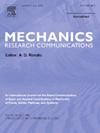A univariate iterative correction strength prediction method for composites considering residual stresses
IF 2.3
4区 工程技术
Q3 MECHANICS
引用次数: 0
Abstract
Traditional strength-ratio prediction method has limitations in considering residual stresses and is prone to misjudging failure modes at low mechanical stress states. To solve this problem, a univariate iterative correction strength prediction method is proposed in this paper. The method considers the residual stress as a constant value and adjusts the mechanical stress variable coefficients iteratively to update the synthetic stress state and make a failure judgment. Case validation shows that the method can accurately predict the damage modes and ultimate loads of composites independent of the mechanical stress levels. Further studies reveal that the residual stress significantly reduces the tensile strength of the laminate (up to 50.8 %) and changes the failure modes (matrix compression failure to tensile failure); the residual stress has a translational effect on the failure envelope, which alters the overall damage envelope of the laminate by translating the damage curves of each single ply. In addition, the proposed residual strength concept can simplify the stress analysis process. The research results provide theoretical support for structural design and strength assessment of composite materials.
考虑残余应力的复合材料单变量迭代修正强度预测方法
传统的强度比预测方法在考虑残余应力方面存在局限性,在低机械应力状态下容易误判破坏模式。为了解决这一问题,本文提出了一种单变量迭代修正强度预测方法。该方法将残余应力视为恒定值,通过迭代调整机械应力变系数来更新综合应力状态并进行破坏判断。实例验证表明,该方法可以准确预测复合材料的损伤模式和极限载荷,而不受机械应力水平的影响。进一步研究表明,残余应力显著降低了层合板的抗拉强度(达50.8%),改变了层合板的破坏模式(基体压缩破坏为拉伸破坏);残余应力对层合板的破坏包络线具有平移效应,通过平移每一层的损伤曲线来改变层合板的整体损伤包络线。此外,提出的残余强度概念可以简化应力分析过程。研究结果为复合材料的结构设计和强度评定提供了理论支持。
本文章由计算机程序翻译,如有差异,请以英文原文为准。
求助全文
约1分钟内获得全文
求助全文
来源期刊
CiteScore
4.10
自引率
4.20%
发文量
114
审稿时长
9 months
期刊介绍:
Mechanics Research Communications publishes, as rapidly as possible, peer-reviewed manuscripts of high standards but restricted length. It aims to provide:
• a fast means of communication
• an exchange of ideas among workers in mechanics
• an effective method of bringing new results quickly to the public
• an informal vehicle for the discussion
• of ideas that may still be in the formative stages
The field of Mechanics will be understood to encompass the behavior of continua, fluids, solids, particles and their mixtures. Submissions must contain a strong, novel contribution to the field of mechanics, and ideally should be focused on current issues in the field involving theoretical, experimental and/or applied research, preferably within the broad expertise encompassed by the Board of Associate Editors. Deviations from these areas should be discussed in advance with the Editor-in-Chief.

 求助内容:
求助内容: 应助结果提醒方式:
应助结果提醒方式:


